Choosing a B2B Web design agency for Growth

Your website isn’t just an online brochure—it’s your most dedicated salesperson. A strategic site, the kind built by a specialized B2B web design agency, becomes your 24/7 lead generation engine, builds instant trust with high-value clients, and acts as the very foundation of your brand’s credibility.
Your Digital Front Door Is More Than Just a Pretty Design

In the B2B world, your website is almost always the first real touchpoint for a potential client. It's where they go to validate your expertise, dig into your solutions, and ultimately decide if you’re a partner worth talking to.
Unlike B2C purchases that can happen on a whim, the B2B buying journey is long, deliberate, and almost always involves a committee of decision-makers. This is precisely where a specialized B2B web design agency proves its worth. They get that a B2B site has to do more than just look sharp; it needs to be a powerful business tool that speaks directly to the unique needs of that complex buying group.
Serving Multiple Decision-Makers
Think about who’s actually visiting your site. A CEO is scanning for ROI, strategic fit, and proof you can deliver results—they want to see case studies. An IT manager, on the other hand, is looking for technical specs, API documentation, and security protocols. A generic website fails to connect with either of them.
A thoughtfully designed B2B website carves out specific pathways for each of these personas:
- For the Executive: You need clear value propositions, high-level benefits, and immediate social proof like client logos and powerful testimonials. This builds confidence in seconds.
- For the Technical Buyer: They require easy access to detailed spec sheets, developer docs, and implementation guides. This shows you’re technically competent.
- For the End-User: Use cases, interactive feature tours, and video demos help them see exactly how your solution solves their day-to-day headaches.
This isn’t just a nice-to-have feature. Research shows that 66% of B2B buyers now expect fully personalized online experiences when sizing up a potential vendor. If you can’t deliver that, you could lose a high-value client before your sales team even gets a chance to say hello.
A great B2B website anticipates the questions of every stakeholder in the buying process. It provides the right information, at the right time, to build consensus and move the deal forward.
Shortening the Sales Cycle
When your website does the heavy lifting of educating and qualifying prospects, it has a massive impact on your sales cycle—it shortens it, dramatically.
Prospects show up to the first sales call already understanding your value. They’re armed with the right information and ready for a productive, high-level conversation. Suddenly, your website transforms from a passive brochure into an active participant in driving revenue growth.
This is why an effective digital presence is truly at the heart of B2B marketing growth, guiding prospects from initial awareness to a final decision with tactical precision. By reframing your website as your hardest-working salesperson, you unlock its real potential to build trust, generate qualified leads, and accelerate your business forward.
Defining Clear Goals Before Your First Agency Call
Reaching out to a B2B web design agency without clear goals is like hiring an architect to build a factory but having no idea what you’re going to manufacture. You’ll probably get an impressive-looking building, but it won’t be equipped to actually produce anything of value.
Before you even think about shortlisting agencies, you have to define what a "win" actually looks like for your new website.
This goes way beyond wanting a "modern design." Your website is a critical business asset, and its redesign needs to be directly tied to specific, measurable outcomes that push your company forward. Get your stakeholders in a room—sales, marketing, product, and leadership—and start asking the hard questions.
From Vague Ideas to Specific Objectives
"We need more leads" is a starting point, not a goal. A real goal is something you can track, measure, and—most importantly—hold your agency accountable for delivering.
The single most important step you can take is translating those fuzzy wishes into concrete business objectives. This mental shift is what separates projects that deliver real ROI from those that just deliver a prettier brochure.
Let's look at how to reframe some common, vague requests:
Vague Idea: "We need a better website."
Specific Goal: "We need to increase marketing qualified leads (MQLs) from organic traffic by 40% within nine months of launch."
Vague Idea: "Our site should integrate with our sales tools."
Specific Goal: "The website must have a native HubSpot form integration that automatically syncs new contacts and assigns lead scores based on content downloads."
See the difference? This level of detail gives a potential B2B web design agency a crystal-clear picture of your expectations. It empowers them to build an accurate proposal and a smart strategy, cutting out the guesswork and aligning their work directly with your business needs from day one.
Documenting Your Core Requirements
With your high-level goals locked in, it's time to get into the details. Create a simple, foundational document that outlines the three pillars of your project: your audience, your tech stack, and your success metrics.
Who Are You Selling To? You can't build a website that converts if you don't intimately understand your ideal customer. Document your buyer personas, including their job titles, biggest pain points, and the questions they're asking at each stage of their buying journey. If you haven't done this work yet, our guide on how to identify target markets for B2B is a great place to start.
What Does It Need to Do? Make a list of all your non-negotiable technical and functional requirements. This might include integrations with your CRM, a multi-language feature for expanding into new markets, or a secure portal for existing clients to log into. Be specific.
How Will You Measure Success? Define your Key Performance Indicators (KPIs) before the project kicks off. These are the numbers you’ll be obsessing over after the new site goes live.
Your primary KPIs might include things like demo request form completions, resource download rates, time on key solution pages, and, of course, the number of sales-qualified opportunities the site generates.
Getting this groundwork done before your first call with an agency is a total game-changer. It shows you’re a serious, strategic partner and ensures every conversation is productive, focused, and centered on one thing: achieving tangible business growth.
How to Vet Portfolios Beyond Pretty Pictures
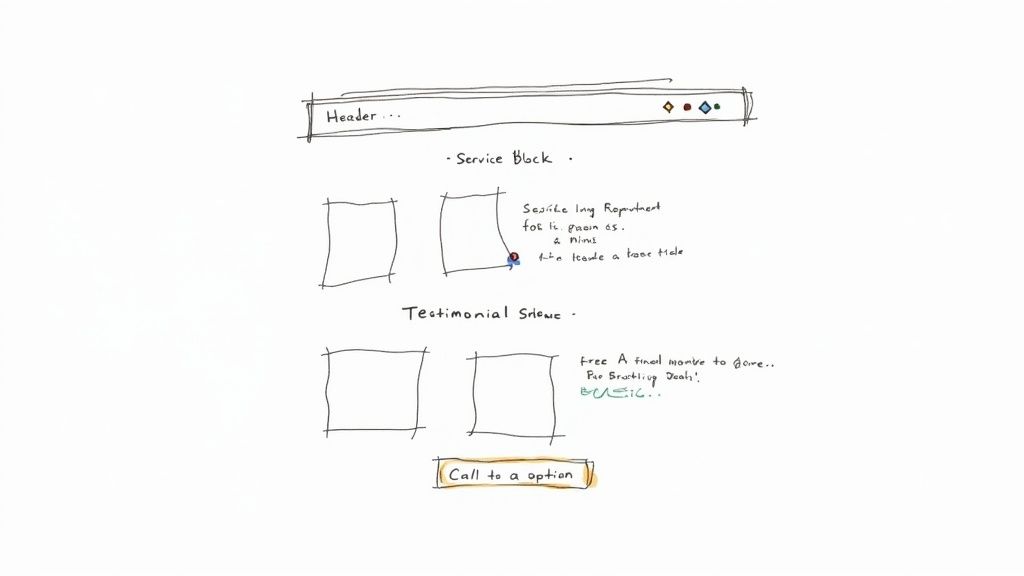
An agency's portfolio is your window into their world, but it’s dangerously easy to get distracted by flashy visuals and slick animations. Let's be clear: you aren't hiring an artist. You're looking for a strategic partner who builds websites that make you money.
That means you have to peel back the layers and look past the surface-level aesthetics. A pretty design is table stakes; a design that drives qualified leads and makes your sales team's job easier is what actually moves the needle.
Search for Evidence of Business Impact
The single most important thing in any B2B portfolio isn't the design—it's the results. Don't settle for a gallery of pretty screenshots. The agencies you want to work with showcase their projects through detailed case studies packed with cold, hard numbers.
You’re looking for specific, quantifiable outcomes. Things like:
- Lead Generation: Did they help a SaaS client boost demo requests by 75%?
- Sales Enablement: Did the new resource center they built contribute to a 20% shorter sales cycle?
- User Engagement: Did they slash the bounce rate on key service pages by 50%?
Metrics like these are proof that an agency knows how to tie web design directly to business goals. The difference is huge, as strong case studies show precisely how customer wins turn into real revenue. For a deeper dive, check out our guide on the impact of case studies for B2B companies.
A great portfolio isn’t a collection of pictures. It’s a library of success stories, each one backed by measurable proof that the agency delivered tangible business growth for its clients.
Assess Industry and Functional Expertise
Next up, find the projects that feel familiar. Has the agency navigated the complexities of an industry like yours? A firm that excels at building sites for local restaurants probably won't grasp the nuances of selling enterprise software or highly technical manufacturing equipment.
Look for direct experience in areas that matter to you:
- Complex Industries: Do they have projects in SaaS, manufacturing, fintech, or other technical B2B spaces?
- Sophisticated Functionality: Have they built sites with tricky integrations, like connecting a product database to a Salesforce CRM or creating a secure client portal from scratch?
- Targeted User Experience: Can you see how they designed specific pathways for different buyer personas, like an engineer versus a CFO?
When an agency has a proven track record of solving problems similar to yours, they’ll get up to speed faster, ask smarter questions, and deliver a website that speaks your customers' language. This is the difference between just hiring a vendor and finding a true partner.
The Critical Questions Every Agency Must Answer
You’ve got a shortlist. You’ve seen some slick portfolios. Now for the hard part.
The initial calls you have with an agency are your chance to cut through the sales pitch and see how they really operate. The truth is, generic questions get you canned, rehearsed answers. But the right questions—the ones that dig into process and strategy—reveal everything.
The goal here isn't just to check off boxes on a capabilities list. It's to understand how they think, how they handle challenges, and whether they see themselves as a vendor or a genuine partner in your growth. A great agency will welcome tough questions. A weak one will get defensive or vague. Pay attention to that difference.
Digging Into Their Strategic Process
Every agency will tell you they have a "process." Frankly, that word is meaningless without the details. You need to pull back the curtain on how they get from your big-picture business goals to a high-performing website that actually generates leads. A fluffy answer about "discovery and design" just isn't going to cut it.
So, push them on the specifics. Ask them to walk you through, step by step, what their discovery phase looks like.
- Do they conduct stakeholder interviews across your commercial and leadership teams?
- How do they evaluate your competitors—not just visually, but strategically?
- What's their methodology for truly understanding your ideal customer profile?
A top-tier agency won't just have answers; they'll have a structured, battle-tested playbook for embedding themselves in your world before they even think about wireframes.
This is critical because your primary business objective—be it lead generation, brand awareness, or something else entirely—should dictate the entire design strategy. It’s not just about aesthetics.
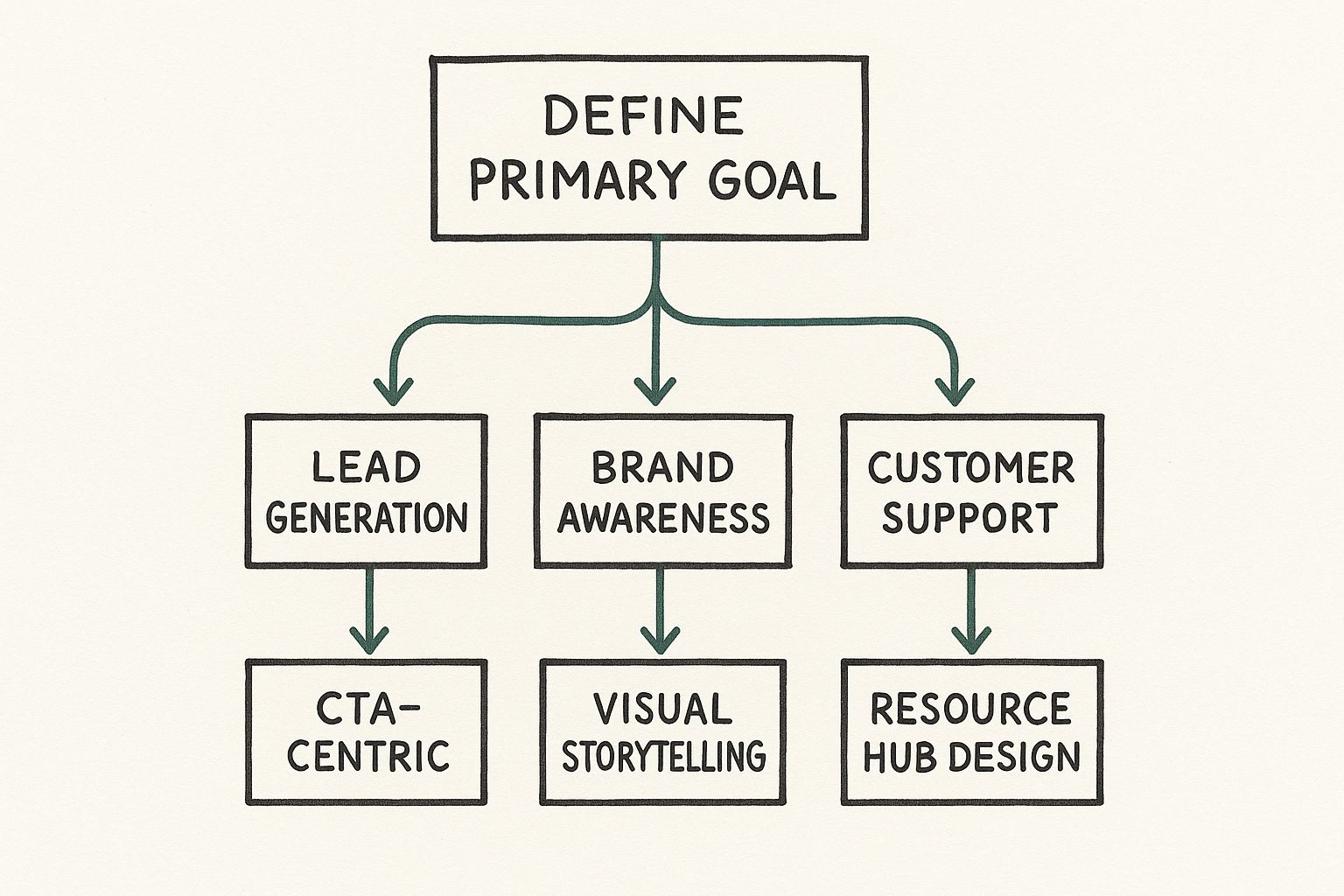
As the graphic shows, a layout proposed for brand awareness will look and function completely differently from one built to capture and qualify leads. If an agency can't connect their design choices directly back to your core business goal, that's a massive red flag.
Questions About Technical Execution and SEO
A beautiful website that nobody can find is just an expensive digital brochure. It’s a complete failure as a business asset.
Technical excellence—especially around site performance and SEO—is absolutely non-negotiable for any serious B2B company. You have to be sure the agency you choose has the ability to build a site that's not just fast and secure, but engineered for organic search visibility from the ground up.
Don't just ask, "Will you make it fast?" That's a "yes" they can give without thinking.
Get specific. Try this instead: "What's your process for Core Web Vitals optimization, and how do you monitor performance after launch?" A solid answer will immediately touch on things like image compression, code minification, and the specific tools they use for ongoing analysis.
To really sharpen your evaluation, it helps to understand what good looks like. Our guide on the fundamentals of SEO for B2B companies will give you the background knowledge to spot a confident, expert answer versus someone just trying to wing it.
An agency’s commitment to technical SEO is a direct reflection of their commitment to your long-term success. If they treat it as an afterthought, they are not the right partner to build your most important marketing asset.
To help you structure these crucial conversations, I've put together a questionnaire. It contrasts the generic questions that are easy to dodge with the strategic ones that force a real, insightful answer. This isn't just a checklist; it's a tool for seeing how an agency thinks.
Agency Vetting Questionnaire
Use these questions to move beyond the portfolio and assess an agency’s strategic depth, process rigor, and technical expertise.
This approach will help you methodically compare agencies and, more importantly, find a team that thinks like a true growth partner, not just a group of designers and developers.
Making Sense of Proposals and Pricing Models
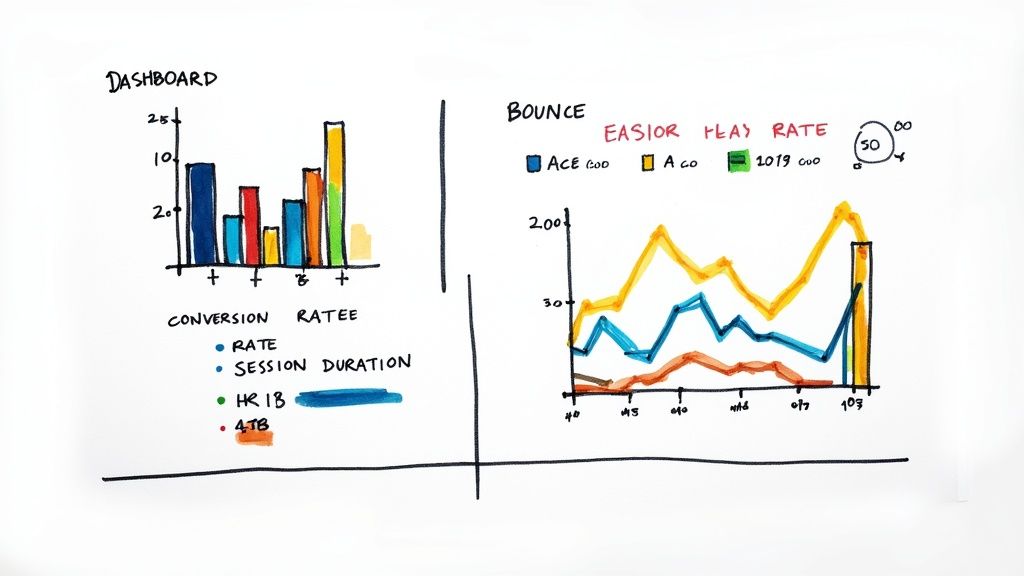
This is the stage where all the clarity you’ve worked so hard to build can vanish into a fog of confusing line items and vague deliverables. When proposals start hitting your inbox, your job is to look past the final number and really dig into the value being offered.
An investment in your website is an investment in your company’s primary growth engine. You’re not just buying a design; you’re buying a result.
That low-cost proposal might look tempting, I get it. But more often than not, a rock-bottom price signals a template-based approach that completely misses the unique complexities of your sales cycle or buyer personas. This is a critical distinction in the B2B world, where a strategic website can directly influence multi-million-dollar deals.
Deconstructing the Price Tag
So, what’s actually driving the cost of a B2B website? It’s rarely just about the design. Several key factors separate a basic build from a high-performance digital asset, and understanding them will give you the confidence to evaluate proposals like a pro.
These are the variables that directly influence the scope and, therefore, the final investment:
- Third-Party Integrations: Does your site need to sync seamlessly with Salesforce, Marketo, or a custom ERP? Complex API work isn't a plug-and-play task; it requires specialized, senior-level expertise.
- Data Migration: Are you bringing over thousands of blog posts, client records, or product specifications from an old, clunky system? This is often a massive project in itself that can be fraught with technical hurdles.
- Ongoing Optimization: A great agency doesn’t just launch your site and disappear. Look for retainers covering performance monitoring, A/B testing, and content updates. This ensures the site actually evolves and improves with your business, rather than becoming obsolete in 18 months.
The U.S. market for B2B web design is a substantial one, valued at around $43.5 billion. You'll see project fees ranging anywhere from $10,000 to $80,000 and beyond. This wide range reflects the deep demand for truly strategic design that drives measurable growth—a hallmark of the top firms in the space.
A strong proposal isn't just a price list; it's a strategic document. It should clearly connect every single line item back to the business goals you defined, showing you exactly how their work will generate a return on your investment.
Ultimately, the goal here is to shift your mindset from cost to value. Stop viewing this as an expense. It's a capital investment in an asset designed to lower your how to calculate customer acquisition cost over time.
Choosing an established firm known for delivering measurable ROI is your surest path to building a digital platform that will power your growth for years to come.
Have More Questions? Let’s Clear Things Up.
As you get closer to picking a B2B agency, a whole new set of questions usually pops up. That's completely normal. This is a big decision, and you need to feel 100% confident you're making the right move.
Let’s tackle some of the most common questions we hear from companies at this stage. Think of this as the final check-in before you sign on the dotted line and kick off a partnership that can genuinely fuel your company's growth.
How Is a B2B Agency Different from a Generalist One?
The real difference comes down to one thing: a deep, almost obsessive, understanding of the B2B buyer's journey.
A generalist agency can build a beautiful website, no doubt. But a specialized B2B web design agency builds a strategic sales tool. They get that your site isn’t for a single consumer; it’s for a buying committee with competing priorities.
This means their focus is entirely different:
- They design for complex sales cycles. B2B decisions aren't made in a day. These agencies build user pathways and content experiences that nurture leads over weeks, sometimes months.
- They build for multiple personas. The site architecture has to work for a CEO scanning for ROI, a technical evaluator digging into specs, and an end-user wondering about daily usability—all at the same time.
- They prioritize lead quality over sheer quantity. Their goal isn't just to flood your inbox with traffic. It's to generate highly qualified leads that your sales team will actually be excited to call.
A true B2B specialist thinks less like a designer and more like an extension of your revenue team. Their success is tied directly to your business outcomes, and that perspective changes everything about how they approach the project.
What Is a Realistic Timeline for a B2B Website Project?
While every project has its own unique wrinkles, you should generally plan for a timeline of 12 to 20 weeks for a custom B2B website.
That might sound like a long time, but a rushed process is the enemy of a strategic outcome. A high-quality build is methodical, with distinct phases that are each critical to getting the final result right.
Rushing a website build is like rushing the foundation of a skyscraper. The cracks won't show immediately, but when they do, the problems will be fundamental and costly to fix.
Here’s a rough sketch of what that timeline usually covers:
- Discovery and Strategy (3-4 weeks): This is arguably the most important part. It involves deep dives into your business, your customers, and your growth goals.
- Design and UX/UI (4-6 weeks): This phase covers everything from wireframing and mapping out user journeys to creating the final visual design that brings your brand to life.
- Development and Integrations (5-8 weeks): Here's where the code gets written. The team will set up the CMS and handle any tricky third-party integrations, like connecting to your CRM or marketing automation platform.
- Testing and Launch (1-2 weeks): Before going live, the site goes through rigorous quality assurance testing to hunt down and squash any bugs for a smooth launch day.
Who from My Team Needs to Be Involved?
Putting together the right internal team is just as important as choosing the right agency. You need a core group that can provide smart input and make decisions without getting bogged down.
While the exact players will depend on your company structure, a solid project team usually includes these key stakeholders:
- A Marketing Leader: They’ll be the one to ensure the site aligns with your company's overall growth strategy and hits its KPIs.
- A Sales Leader: You need their buy-in to confirm the site effectively supports their sales process and answers the questions they hear from prospects every day.
- A Product or Technical Expert: This person validates the accuracy of technical information on the site and can guide any complex integration requirements.
Your primary point of contact will handle the day-to-day communication, but getting input from this cross-functional group ensures the final website is a powerful asset for the entire organization, not just a siloed marketing project.
As you weigh your options, you'll also find it helpful to understand how different specialized agencies fit into the bigger picture, like grasping the value of a B2B SEO agency alongside web design. Choosing the right partners—both inside and outside your company—is the first step toward building a digital presence that actually drives results.
At Big Moves Marketing, we specialize in building conversion-ready websites and growth strategies for B2B tech companies. If you're ready to transform your digital presence into your hardest-working salesperson, let's talk. Learn how our fractional CMO expertise can build a clear roadmap for your success at https://bigmoves.marketing.
Article created using Outrank
%20-%20Alternate.svg)

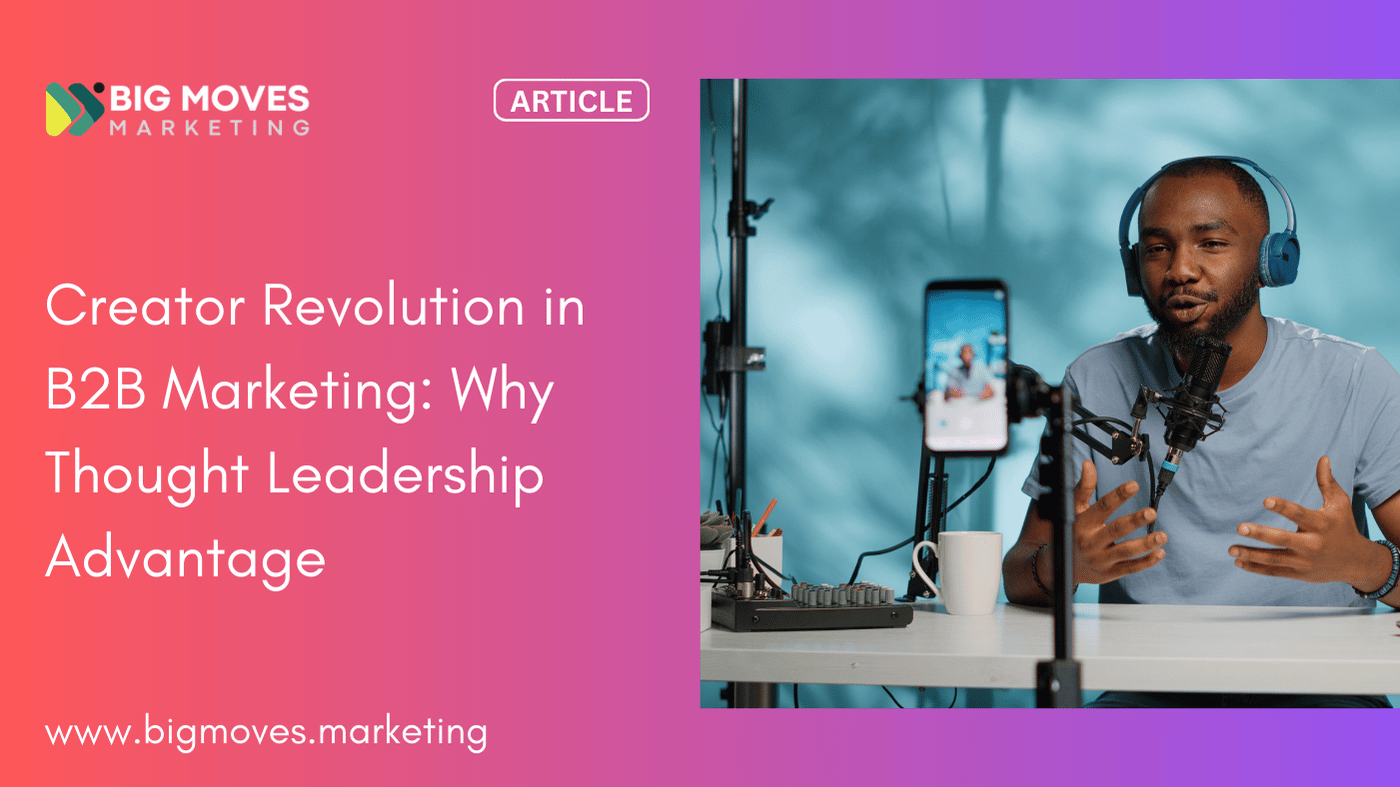

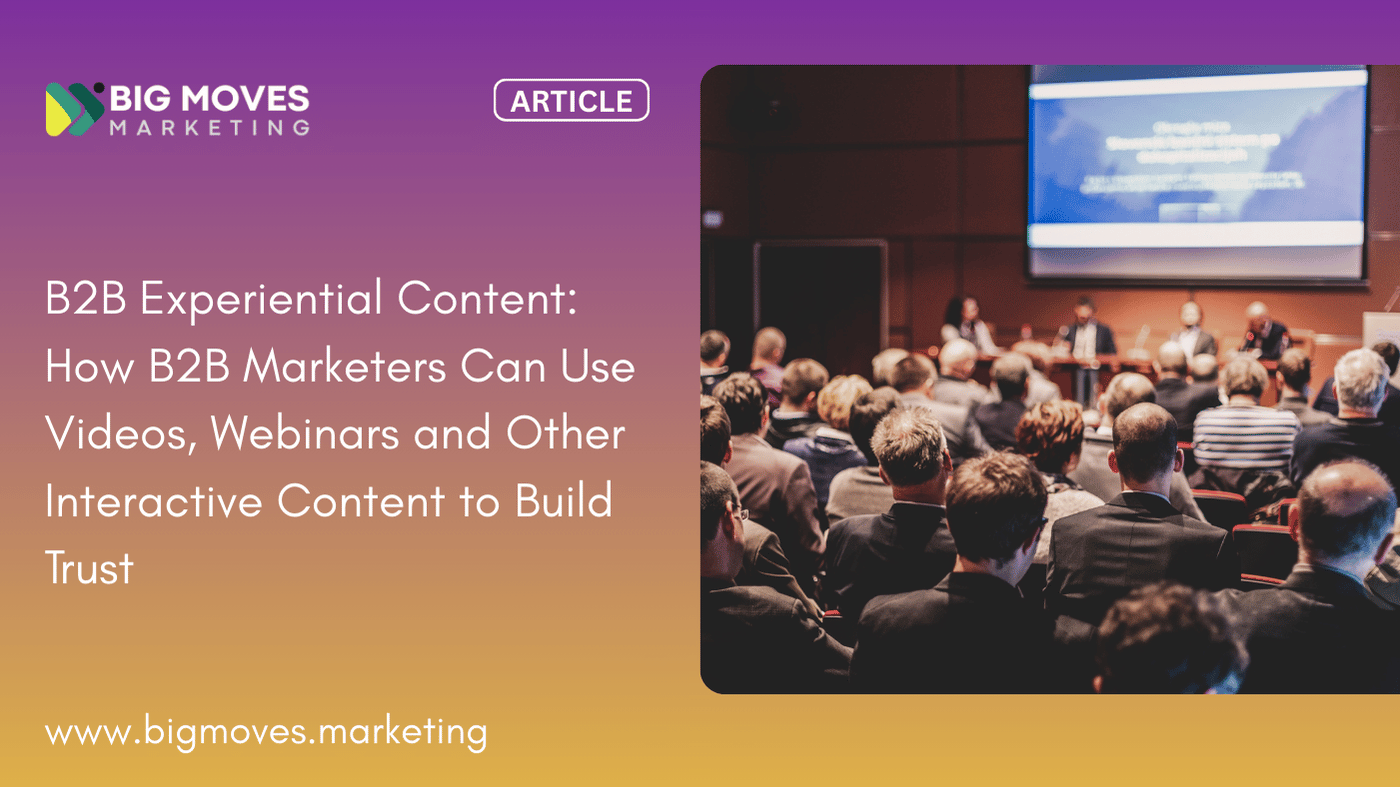


%20-%20white.svg)